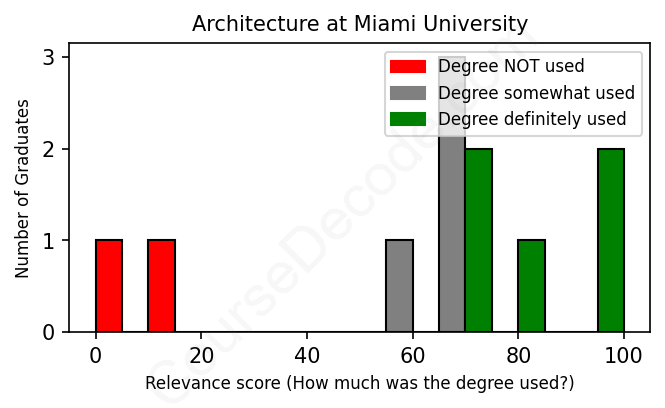
First, some facts. Of the Architecture graduates from Miami University we've analyzed , here's how many have used (or NOT used) their degree in their career:

These are estimates based on AI analysis of 11 LinkedIn profiles (see below).
The verdict? Slightly below average. Overall, with an average relevance score of 63%, Architecture graduates from Miami University have a slightly lower likelihood (-4%) of finding work in this field compared to the average graduate across all fields:
And for comparison, here's the chart for all profiles we've looked at across all degrees.
Also, after graduating, 54% of these graduates have pursued further education other than another Bachelor's degree (such as a Masters degree or other), compared to the average across all profiles of 35%. This suggests you may need more than just a Bachelors degree to be competitive as a Architecture graduate.
See the details:
|
Relevance score: 65% We think this person has gone into a career only somewhat relevant to their degree. We think this person has gone into a career only somewhat relevant to their degree.
DEGREE INFOGraduated in 2023 from Miami University with a Bachelor of Arts - BA in Architecture. No other secondary education since. JOB HISTORY SINCE GRADUATIONDrafter Contech Engineered Solutions May 2023 - Feb 2024 CAD Designer Structural Technician  THP Limited, Inc Apr 2024 - Present ABOUTNo information provided. |
The top 10 most common jobs done by the graduates we've analyzed (ranked most common to least) are:
Here is a visual representation of the most common words in job titles for Architecture graduates (this is across all Architecture graduates we've analyzed, not just those who went to Miami University):

Looking at the career paths of Miami University architecture graduates, it seems there’s a mix of successes and some wandering off the main architectural track, especially in the early stages right after graduation. For many of these graduates, their first jobs out of school generally align with architecture—positions like intern architect, architectural intern, or graduate architect indicate that they’re stepping directly into roles that build on their education. However, there are also some graduates who took paths that strayed significantly from architecture. For example, some ended up in roles related to graphic design, teaching, or even the military, which might suggest they weren't able to find immediate positions in architecture—either due to job market conditions or personal interest shifts.
As we look five or even ten years down the line, there’s a clearer picture. While some graduates who started as interns have found their way into established roles like project managers and senior designers at recognizable companies, others have either moved into unrelated fields or taken on jobs that barely apply their architectural training. The results after five years show that those committed to architecture tend to solidify their careers in it, with some even landing jobs at big names like Amazon or becoming urban designers. However, plenty of others have ventured into areas like business consulting or graphic design, showing that while an architecture degree offers great foundational skills, it doesn’t always lead straight back into traditional roles in architecture. Overall, it's a mixed bag, but there’s definitely a solid group of graduates moving toward successful, relevant careers in the field!
A Bachelor’s degree in Architecture can be pretty challenging, and Miami University is no exception. It’s definitely more demanding than a lot of other majors because it combines heavy design projects, technical skills, and a ton of coursework in art, engineering, and math. You’ll find yourself juggling long hours in studio classes, tight deadlines, and critiques that can feel a bit intense. Plus, there’s a creative aspect to it that requires a lot of personal input, which can be both fun and stressful. Overall, if you're really passionate about design and architecture, the hard work can feel totally worth it, but be ready for a commitment—it’s definitely not a walk in the park!
Most commonly, in the LinkedIn profiles we've looked at, it takes people 4 years to finish a Bachelor degree in Architecture.
Looking at these Architecture grads from Miami University, it seems like there's a mixed bag when it comes to their earning potential. The earlier graduates, especially those who started working as interns or in lower-level positions right after school, likely didn’t make much at the beginning—internships often pay peanuts. However, as they moved up in their careers, especially those working for big companies like Amazon or Gensler, they probably started to see some decent money rolling in. The more recent grads seem to be starting out in similar intern roles or even part-time jobs that won’t break the bank, making it harder to say they’re making a lot right off the bat. So, it looks like the earlier you graduate, the more chances you have to hit the jackpot later, but the initial years might be a bit of a financial struggle.
Here is a visual representation of the most common words seen in the "about" section of LinkedIn profiles who have a Bachelor degree in Architecture (this is across all Architecture graduates we've analyzed, not just those who went to Miami University). This may or may not be useful:

Here are all colleges offering a Bachelor degree in Architecture (ordered by the average relevance score of their Architecture graduates, best to worst) where we have analyzed at least 10 of their graduates: